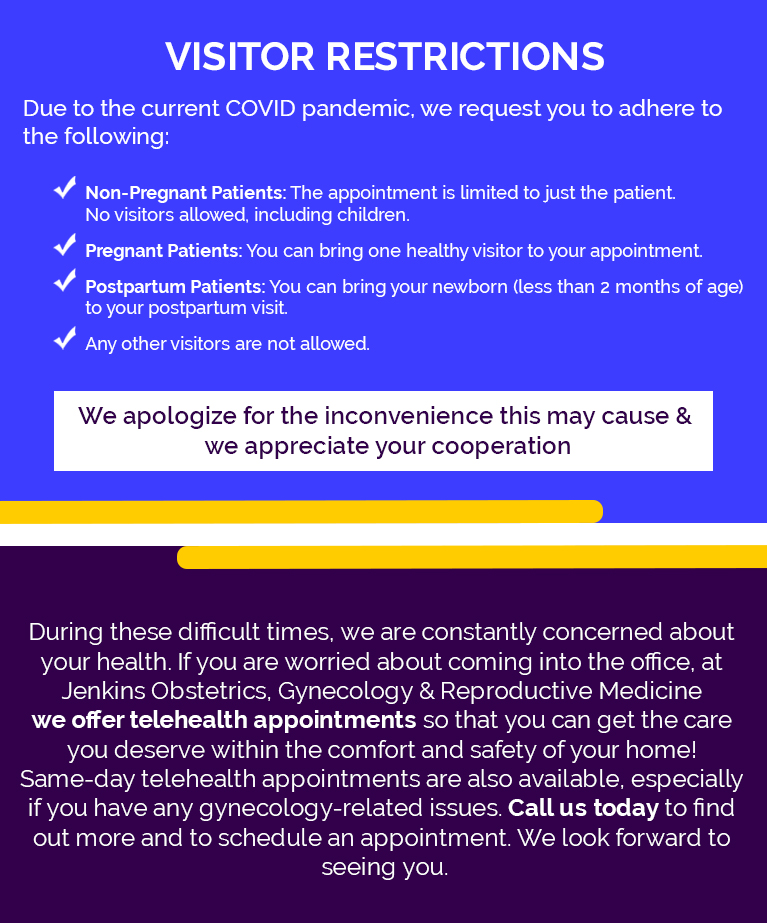

19
Jun
Katy, TX area medical team shares important facts every female should know about her reproductive health

A female’s reproductive health plays a vital role in overall wellness. In order to stay healthy, women should understand the major health concerns they are facing and how they can reduce risk. Additionally, women should understand how their bodies work including such thing as, “Why do I get a period every month?” “What are the symptoms of a sexually transmitted disease?” At Jenkins Obstetrics, Gynecology & Reproductive Medicine in Katy, TX, we want to empower females to understand reproductive health, their bodies, and how they can play an active role in their wellness. Let’s examine some very important facts that women should know about their reproductive health.
You should understand your menstrual cycle
The menstrual cycle is the naturally occurring change in a woman’s body to prepare her for pregnancy. In fact, the average woman gets her period about 450 times throughout her life. Understanding your menstrual cycle is important because it can give clues to your overall reproductive health. Changes in your menstrual cycle could indicate something going on and are important to communicate to your doctor. For example, If your menstrual cycle is normally short and symptom-free and suddenly you start experiencing a heavier flow and cramps, you should check-in with your gynecologist.
Understanding your menstrual cycle can also play an important role in your fertility. Tracking your period can help you know when your ovulating and when you are most likely to get pregnant.
You should know the symptoms of sexually transmitted diseases and get tested regularly
Did you know that every year thousands of women become infertile due to undiagnosed sexually transmitted infections? Many sexually transmitted infections are silent or asymptomatic, so by the time some women are diagnosed, they have already run into problems. If you are sexually active you should understand the symptoms of the most common sexually transmitted diseases and talk to your doctor about regular screening tests.
855-346-8610
281-347-2600
You should be getting regular pap smears and well woman exams
Pap smears are one of the most effective ways to identify cervical cancer. The American Sexual Health Association estimates that nearly 80 percent of sexually active people will contract the HPV virus in their lives. While many of these causes end up being harmless, in some cases, the strain can cause cervical lesions that, over time, can develop into cervical cancer. Regular screening is important to prevent this from happening. Recommendations for pap smears are to begin at 21 and screen every two years until 29. At that point, asymptomatic women with normal screening results may move on to pap smears every 3 years. Well woman exams should continue every year.
You should know that fertility declines with age and other factors that can impact fertility

Age-related fertility issues are becoming more and more common as men and women wait until later to start their families. A woman’s fertility begins to decline her 30s as the number of eggs in the ovaries continues to decrease.
A woman’s best chances of getting pregnant are in her 20s and those chances continue to decrease after the age of 30, and especially after the age of 35. By the age of 40, a woman’s chance of getting pregnant goes down to less than 5% per cycle.
There are other factors that affect fertility. Your weight is one of them. Women who are overweight can encounter hormonal issues that impact ovulation, while women who are underweight may not have the necessary body fat required for ovulation.
Timing of sexual intercourse is also important in fertility. This relates directly back to understanding the menstrual cycle and the timing of ovulation. A female is fertile for the five days proceeding ovulation along with the day of ovulation. Having sexual intercourse on the days prior to ovulation actually increase the chance of getting pregnant.
Understanding important facts about your reproductive health is critical to fertility and overall health
At Jenkins Obstetrics, Gynecology & Reproductive Medicine in Katy, TX, we are your partners in reproductive health. We encourage all our patients to maintain annual well-woman exams and feel free to discuss any questions or concerns you have with us. To schedule an appointment, please give us a call at 855-346-8610
Share this Article
Jenkins Obstetrics, Gynecology & Reproductive Medicine
Connect with Dr. Jenkins on Linkedin





We offer general care, gynecology, and obstetrics services that span all stages of a woman's life. Dr. Taryll L. Jenkins, MD received his undergraduate degree from Louisiana State University and Doctorate of Medicine from Meharry Medical College School of Medicine, TN. He completed his residency training at the University of Texas and Hermann Hospital, TX and is Board-certified from the American College of Obstetrics and Gynecology, with years of research experience.
Having graduated from the University of Texas at Arlington with a Bachelors of Science in Biological Chemistry in 2011, Dr. Stephanie Roy received her Doctor of Medicine Degree in 2015 from the University of Texas Medical Branch. Today she is a leading Board-certified physician who works hard to provide you and your family with high quality services. In addition to spending time at the practice, Dr. Roy possesses extensive volunteer experience in the community. She was also a tutor at the Medical Careers Diversity Program in 2012 and since then has spent her free time volunteering for the St. Vincent’s Clinic.
Dr. Tiffany Ikwuagwu is passionate about caring for the diverse communities in Katy and Houston, TX. Having completed her undergraduate degree at the University of Houston, her medical degree at the Baylor College of Medicine, and her residency in obstetrics and gynecology at the McGovern Medical School, she worked as principal investigator on a research project with Dr. Nana Ankumah at UT Houston. A member of the American Medical Association, Texas Medical Association, and American College of Obstetricians and Gynecologists, Dr. Ikwuagwu has served in several leadership roles and has made many contributions to the community.
Yara Ramirez, MD earned her Bachelor of Science degree from Baylor University and her doctorate in medicine from the University of Texas Medical Branch (UTMB) in Galveston where she also completed her residency. She won the Resident Teaching Award from UTMB’s Department of Obstetrics and Gynecology for two consecutive years.
Dr. Ramirez has researched extensively on many obstetrics-related topics. She has been a Junior Fellow Representative for the UTMB Residency Program and a Medical Student Education Committee Member at the American College of Obstetrics and Gynecology. She has volunteered for various local and foreign community programs. Her fluency in Spanish and French is an asset to her organization.
Nadia Alexander is a Board-certified Family Nurse Practitioner with a Master’s of Science degree in Nursing from the University of Texas Health Science Center. With seven years of experience in women’s health and a focus on obstetrics and ambulatory gynecology (vaginitis, UTI, and vaginal bleeding), she provides quality, compassionate care to patients in various stages of reproductive life. She is fluent in English and Spanish and is the lead contact for our Telehealth service.

































